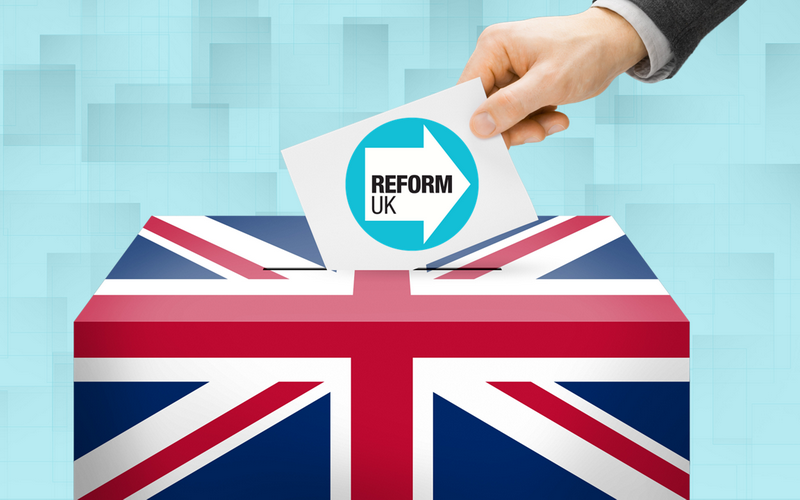Election 24 – The Manifestos – Reform UK
The Reform UK Manifesto: Robert Salter provides an Analysis of the Key Tax Messages
The Reform UK Manifesto
Overall, it is certainly fair to say that the Reform Party’s tax manifesto certainly has some measures that would be attractive to particular parts of the population. For example, increasing the IHT threshold would take some people out of IHT totally – and IHT is generally ‘hated’ as a tax, even though it impacts only a relatively small number of people – whilst freelance contractors (e.g. in IT roles) would certainly be pleased to see the end of IR35.
However, it is fair to say that this is quite a superficial tax manifesto with one to two measures which are superficially attractive, but little real thought being given to how these proposals would be funded and how one would actually make the idea of ‘Singapore-on-Thames’, for example, a practical reality.

The Reform UK Manifesto: An Analysis of the Key Tax Messages
Inheritance Tax (IHT)
Reform have said that they would abolish IHT for all estates under £2m (compared to the present limit of £325,000 – though with lots of additional reliefs etc. available in particular circumstances) and only charge the excess over £2m at 20% (compared to the headline rate of 40% presently). It is not clear how ‘potentially exempt transfers (that is, gifts which are given 3+ years before death and which are entitled to a reduced IHT liability under the existing rules), will be treated under the Reform proposals.
IHT is always a ‘favourite’ target of right-wing parties, and this policy will certainly appeal to the Reform Party’s base. However, in practice, IHT only hits a small percentage of all estates (around 4%-5% each year), so even if this proposal were to become law, it would make no difference for the great majority of taxpayers.
Income Taxes
This is perhaps the core focus of Reform’s tax proposals. Specifically, the personal tax allowance would increase to £20,000 and the 40% tax band would only start at £70,000 (compared to the present threshold of £50,270 per annum).
It is clear that these changes would be welcomed – at least initially – by many taxpayers caught by the last Government’s deliberate policy of ‘fiscal drag’ that is, tracking more and more people into tax (or higher rates of tax), simply because of the impact of inflation on their wages or self-employed profits.
However, these proposals would appear very difficult to achieve from an overall funding perspective. Not only are the headline cuts in themselves incredibly expensive for the Government, but one also needs to note that they would, in simple terms, totally reverse the ca. £34bn of additional taxes that the Government was presently hoping / expecting to get in the years up until 2027/28 through fiscal drag’. As such, from an overall Government funding / black hole perspective, this could easily be a ‘double whammy’.
Corporation Tax
Reform have proposed to reduce corporate tax rate to 15% over time (compared to the present rates of 19% or 25% depending upon the size of the business concerned). The hope / argument is that lower rates of Corporation Tax will, for example, help make the UK an attractive place for foreign direct investment (FDI).
In practice, however, Corporation Tax rates are only ever one aspect of a businesses’ FDI decisions and it isn’t clear, whether this measure would really encourage business investment and growth in the UK. Moreover, one would really need to understand what changes, if any, Reform would plan to make to the ‘tax base’, to understand whether this proposed measure is really a tax win for businesses. Experience shows that Governments boasting about their ‘low corporate tax rates’, often actually have a tax base that is ‘higher’ than countries with headline Corporation Tax rates which are more.
Employer NIC and Migrant Labour
The party have proposed a 20% employer NIC rate on ‘foreign labour’, on the basis that this is designed to ‘encourage companies to employee UK personal’. Whilst there are some easements within the manifesto – e.g. for NHS and social care staff and for those employers which employ fewer than 5 people, it is again difficult to see this as a realistic policy (at least without a great deal more clarification on the part of Reform).
For example, one of the ideas behind Brexit (and Reform is basically a modern version of UKIP) is that the UK could become a type of ‘Singapore-on-Thames’ – that is, in broad terms, a hub for international businesses investing in Europe. However, imposing a NIC surcharge on such companies – who typically set-up in the UK with personal from their home location – would hardly align with the Singapore-on-Thames image of a post-Brexit Britain.
Similarly, making it harder (and more expensive) for traditional UK-based companies to access the skills and experiences of international staff, who may have skills which are not available in the UK or market insight and knowledge which is vital for that British business to succeed internationally, appears to be in many respects ‘counter-productive’ and certainly not ‘business friendly’.
IR35 (Deemed Employment Issues)
The issue of whether someone working through a Personal Service Company (that is a limited company, which they own fully or mainly) has long been a ‘contentious issue’ and has resulted in a number of tax cases (e.g. Kaye West, Eamonn Holmes, Adrian Chiles, Gary Lineker), which have taken many years to resolve (or are still ongoing in the case of Chiles and Lineker). The IR35 laws also cause many problems for employers (deemed employers) of contractors, who have since 2021 been responsible for making the assessments as to whether PAYE and NIC is due on the contractors’ invoices.
As such, it is certainly a valid area for any Government to consider changing (or in the part of Reform, removing the legislation entirely). However, if Reform are serious about genuinely creating a longer-term ‘solution’ in this whole area, they would need to ensure that any abolishment of IR35 is matched by changes to the labour law regulations (one can presently be an employee for tax purposes and self-employed for labour law purposes, for example), and an updating of the employment versus self-employment position for ‘sole traders’ (who aren’t – despite the claims of the Reform Party manifesto – actually caught by IR35, but much older case law principles).
Indirect Taxes (Business Rates, Stamp Duty)
Reform are looking at totally reforming the business rates system – which is designed to ‘save the high street’ and ensure high street businesses can compete on a ‘fair basis’ with virtual and online competitors. Additionally, Reform is planning to reduce the rates of Stamp Duty which apply and increase the thresholds (e.g. 0% stamp duty on sales of up to £750k compared to the present core threshold of £250k).
However, whilst it is fair to say that ‘rates’ are often outdated as a property tax system and stamp duty is a ‘bad tax’ according to many advisors, the proposals in this area are still ‘light on detail’. One should also note that reducing Stamp Duty, for example, on the sale / purchase of domestic property has not traditionally actually involved in any ‘cost saving’ to the purchaser. Rather, the evidence shows that removing (or reducing) VAT simply results in the vendors actually being able to demand higher prices from the buyers and no effective ‘cost win’ arising for the buyers.
VAT
Perhaps the core proposal in this regard, is to lift the VAT threshold to £150,000 per annum – i.e. businesses with a turnover below this threshold would not be obliged to register for VAT. The present turnover threshold is £90,000 per annum and the move is officially designed to ‘remove and reduce red tape’.
However, in practice, it is quite questionable whether this change would make a meaningful difference to many smaller businesses. For example, many businesses which are dealing with VAT-registered clients would still typically be obliged to register for VAT, to assist their ‘end clients’, who may wish to reclaim their ‘input VAT’ (and this would only be possible if the small business is VAT-registered). Having said that, the proposal to increase the VAT threshold to £150,000 might bring an end to the simplified, flat rate VAT scheme which is presently available to those businesses with turnover of up to £150,000 and for some businesses (e.g. those dealing with private clients), this might be a positive.
Additionally, it is worth highlighting that increasing the VAT threshold to £150k, will not actually really encourage small, family-owned businesses to expand significantly – any business which is genuinely focused on growth will quickly exceed the £150k turnover threshold realistically and become liable to VAT registration anyway.

You may also be interested in

Is the End of the Triple Lock Pension Inevitable?

The UK is a stable, open and innovation-driven market for Japanese firms to invest in













